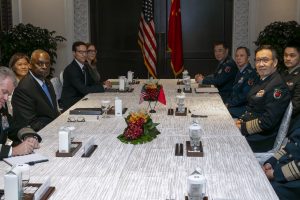When was the last time you called an automated customer service hotline, desperate to explain your issue, only to find that none of the options fit your needs? Now imagine the hotline keeps parroting irrelevant responses – except millions of lives depend on you getting your point across. This is the daily reality for many military personnel in the Pacific when dealing with their Chinese counterparts.
While global conflicts have been avoided in the past through diplomacy and direct communication – even between bitter adversaries like the United States and Russia – China’s military and Communist Party officials often rely on rigid, scripted responses that obstruct meaningful dialogue. Instead of exchanging information, they parrot party lines, ignore pressing questions, or refuse to engage altogether.
The stakes could not be higher. Misunderstandings in this fragile geopolitical environment, especially with current shifts to more militarization and conflict, risk triggering unnecessary escalations that could spiral into full-scale conflict.
Chinese military officials and diplomats have long displayed a frustrating communication style that prioritizes adherence to party doctrine over constructive engagement. At Harvard Kennedy School, a high-ranking U.S. military official recently described meeting with a senior Chinese counterpart: Every question posed to the Chinese delegation was met with scripted responses. Even worse, these responses bore no relation to the actual questions. While U.S. officials sought to build trust and mutual understanding, the Chinese side remained steadfastly robotic, effectively stonewalling any meaningful exchange.
This behavior is not limited to military interactions. Most people working on China policy can recall similar encounters with Chinese officials. As panel discussions, representatives from the Chinese embassy or businesses respond to questions with memorized answers, dismissive responses, or vague platitudes, especially when questions touch upon topics that are not entirely in China’s favor such as censorship and the Great Firewall. The priority is not engagement but controlling the narrative.
This rigid approach, while frustrating in academic settings, becomes catastrophic in military or diplomatic scenarios.
The world has already witnessed close calls. In 2001, a U.S. military plane collided with a Chinese fighter jet over the South China Sea. The Chinese pilot died, while the U.S. crew had to perform an emergency landing on China’s Hainan Island. For days, U.S. officials struggled to contact their Chinese counterparts and get information to negotiate the crew’s release.
Imagine how such a situation could escalate today, with tensions over Taiwan, the South China Sea, and territorial disputes running high. The United States Department of Defense has accused China’s military of being responsible for “scores of dangerous incidents in the air and at sea.” Those risks are compounded when senior military officials – much less the individual crewmembers and pilots involved in encounters with foreign militaries – refuse to engage in meaningful communication.
Take the frequent harassment of fishing boats by China Coast Guard vessels. These small-scale provocations could easily spiral into larger conflicts if misinterpreted. In a scenario where communication fails, one nation’s defensive maneuver could be seen as aggression, triggering a chain reaction. Add the unpredictable and testosterone-driven behavior likely under the Trump government and the margin for error shrinks further. Miscommunication is not just a risk; it is a recipe for disaster.
One defense of this communication style might be that Chinese officials fear personal repercussions. If they speak too freely or deviate from approved party lines, they risk punishment back home. While valid, this underscores the urgent need for systemic change. China’s top leadership must create an environment where officials can engage openly and constructively, without fear of retribution, to protect their country and build trust. If Beijing wants to avoid raising the next generation in an era of perpetual conflict, it must prioritize transparency and communication.
China’s uncooperative approach to dialogue is not just dangerous, it is counterproductive for China. It is not in the interest of the world’s second-largest economy to alienate the very nations it wants to cooperate with for growth and stability. A culture of constructive communication would not only reduce the likelihood of conflict but also improve China’s global standing, building trust where suspicion or annoyance currently reigns.
What needs to change? For starters, in addition to rote memorization of Communist Party doctrine, Chinese military and diplomatic training must emphasize the value of open dialogue and critical thinking. Officials must be empowered to adapt their responses to the nuances of each interaction rather than falling back on generic statements. Additionally, Beijing must establish protocols for swift and transparent communication during crises to prevent misunderstandings from escalating. This includes clear points of contact for foreign military and diplomats.
International pressure can also play a role. Other nations must consistently push for better communication standards in their interactions with China, framing it as a shared interest rather than an imposed demand. Building trust through multilateral forums and joint initiatives can set the stage for more productive engagement. Non-government organizations, including think tanks, can also push for open and transparent communication with Chinese counterparts.
Miscommunication is not just an inconvenience; it is a threat to global stability. By fostering a culture of open dialogue, China can help prevent the next global conflict – not through force, but through understanding.
The stakes are too high to ignore. It is time for China to rewrite its communication playbook before it is too late.

































